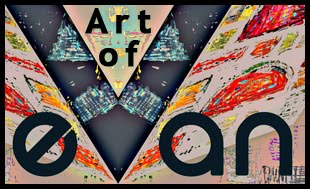I have been pondering, exploring and reading about the educational process. Authors such as John Taylor Gatto, Paulo Freire, Naomi Klein, Jean Jacques Rousseau, Noam Chomsky, Thomas Paine and Robert Kiyosaki have definitely influenced my educational process. Since I am an artist, I'll add that the American philosopher John Dewey, who wrote Art as Experience, has influenced my current train of philosophical thought as well.
I'd like to address the Biblical origin of "knowledge." Most of us know that knowledge was attained by Adam eating the Fruit of Knowledge, or the Fruit of Good and Evil, after being tempted by Eve who was initially seduced by the serpent, or Satan. After Adam and Eve both ate the Fruit of Knowledge, they were banished from the Garden of Eden. They were "condemned" to live a life of mortality and shame.
Fast-forward to our present epoch of knowledge, understanding and education. Many of us have heard the popularized quote that "knowledge is power." How is knowledge power? If you can critically understand a subject or situation overall then you have a much better ability to affect yours and others' surrounding situation. This means you can use your attained knowledge for the benifit of all, or you can use it for the benefit of yourself without any thought of others outside of yourself or your circle of relationships.
Now comes the term "awareness." That, of course, means what you are aware of in your relationships with others and also in your current surroundings. It can also extend out to surroundings that are not in your immediate vicinity, but are physically adjacent to your immediate area. An example would be your next door neighbor. That would be what I would call a locational awareness. A dispositional awareness––as I define it for the time being––of your neighbor would be understanding or having knowledge of her or his current livelihood, such as his job and his relationship with his job.
There are some people who actively believe that "ignorance is bliss." This means that the less one knows the more happy one is. This is a philosophy, if you can call it that, which some people don't personally impose on themselves, but impose upon others. This would apply to people in influential positions of culture and society who have a critical impact upon physical surroundings, and, most importantly, other peoples' lives and livelihoods.
It is well known that our contemporary American culture of capitalism is hinged upon the famous biologist Charles Darwin's theory of "survival of the fittest." This is intended to promote a healthy form of competition amongst people who own businesses or are involved with business in some way. Since most of us can't escape the reality that we live in a capitalist society, we have all adapted in some way to our living situations, our way of surviving, and the forces surrounding us. Education becomes a very critical deciding factor in how well we prosper or survive in these circumstances.
After reading a few books about education, money, capitalism, philosophy and government, I have settled upon a "satisfactory" theory. A book that introduced me in my current process of learning was written by an author named Robert Kiyosaki, called Rich Dad's Conspiracies of The Rich. What is so compelling about this book is the fact that Kiyosaki is a capitalist and he professes to educate people how money works in our contemporary capitalist society. He explains how very wealthy and powerful people have no interest in educating people about how money works because it would create a real problem of competition with them, their power, their influence, and their wealth. The connections should be apparent of how "ignorance is bliss" and "knowledge is power”; and how a "guiding hand" in the educational process for the general population would be highly important for the status quo to manage and control.
Kiyosaki suggests reading Weapons of Mass Instruction, by John Taylor Gatto who taught in the public school system in New York for thirty years. The research he compiled in his book is relevant, critical and historical in understanding how modern public schooling is designed for a highly conditioned ignorance amongst the general population, for the benefit of a smaller percentage of the wealthiest people in our society. One example, that both Robert Kiyosaki and John Taylor Gatto point out, is the fact that money is not even a basic subject taught in schools.
Going back to the original idea I started this blog off with about the Garden of Eden, and the Fruit of Good and Evil. I have had the personal experience or awareness that when I learn something new I feel obligated to tell others about my learning. It could also be a desire to share knowledge, for the benefit of all, for trust, for alliances, and, ultimately, survival. How can that be, when our genes are supposedly designed for "survival of the fittest"? Another thing I noticed is that the more critical to survival the knowledge I may have gained, the more "weight" or moral obligation I feel in relation to knowing about it. This is my current interpretation of the ideas presented in Genesis in the Bible.
I conclude that people with the most material power and influence see it as imperative that the majority of people remain ignorant about money, worldly affairs, their affairs, and economic affairs. Hence, a blissful ignorance is taught and promoted, and critical awareness and knowledge is branded as "off limits," secret, private, and is considered suspicious if someone has it.
eVan––January 9th, 2011

No comments:
Post a Comment